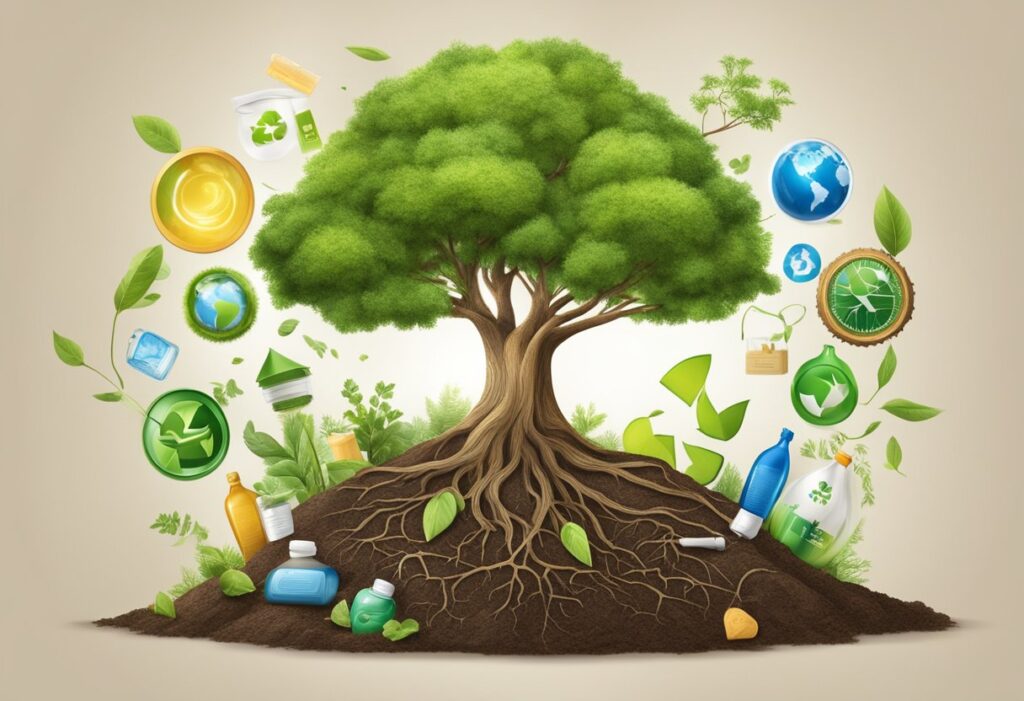Sustainable marketing is a concept that has gained significant traction in recent years. It is a marketing strategy that focuses on promoting products or services that are environmentally and socially responsible.
Sustainable marketing is not only beneficial for the environment, but it also has several economic advantages for businesses.
Fundamental Principles of Sustainable Marketing include promoting environmentally friendly products and services, reducing waste and pollution, and promoting social responsibility.
This approach not only helps businesses to reduce their environmental impact but also helps them to build a positive reputation among consumers who are increasingly concerned about the environment.
In addition, it can help businesses to differentiate themselves from their competitors.
One of the most significant economic advantages of sustainable marketing is that it can help businesses to reduce costs.
By promoting environmentally friendly products and services, businesses can reduce their energy consumption and waste production, which can lead to significant cost savings.
Furthermore, sustainable marketing can help businesses to attract and retain customers who are willing to pay a premium for environmentally and socially responsible products and services.
Key Takeaways
- Sustainable marketing is a marketing strategy that promotes environmentally and socially responsible products and services.
- Fundamental Principles of Sustainable Marketing include promoting environmentally friendly products and services, reducing waste and pollution, and promoting social responsibility.
- Sustainable marketing can help businesses to reduce costs, attract and retain customers, and build a positive reputation.
Fundamental Principles of Sustainable Marketing

Sustainable marketing refers to the practice of promoting products, services, and brands in a way that minimizes negative environmental and social impacts. It involves adopting responsible and ethical marketing strategies that contribute to long-term sustainability.
The following are some of the fundamental principles of sustainable marketing:
1. Social Responsibility
Social responsibility is a key principle of sustainable marketing. It involves taking into consideration the impact of business operations on the community and the environment.
Companies that practice social responsibility are committed to making a positive impact on society and the environment. They take steps to reduce their carbon footprint, promote sustainable practices, and support social causes.
2. Transparency
Transparency is another important principle of sustainable marketing. It involves being open and honest about business practices, policies, and operations.
Companies that practice transparency are more likely to gain the trust and loyalty of their customers. They provide clear and accurate information about their products and services, including their environmental and social impact.
3. Consumer Education
Consumer education is a key component of sustainable marketing. It involves educating consumers about the environmental and social impact of their purchasing decisions.
Companies that practice consumer education provide information about the sustainability of their products and services, and encourage consumers to make informed choices.
4. Innovation
Innovation is an essential principle of sustainable marketing. It involves developing new products, services, and business models that are environmentally and socially responsible.
Companies that practice innovation are more likely to stay ahead of the competition and meet the changing needs of consumers. They also have the potential to create new markets and opportunities for growth.
Economic Advantages

Sustainable marketing offers several economic advantages to businesses that embrace it. These advantages include cost savings and long-term growth.
Cost Savings
Implementing sustainable practices in marketing can save businesses money by reducing waste, energy consumption, and other expenses.
For example, using digital marketing methods such as email and social media can reduce the need for paper-based advertising, resulting in cost savings for printing and distribution.
Another way sustainable marketing can save businesses money is by optimizing the supply chain.
By working with suppliers who use sustainable practices, businesses can reduce costs associated with waste disposal, transportation, and other expenses.
For instance, companies can reduce transportation costs by sourcing raw materials and finished products from local suppliers.
Long-Term Growth
Sustainable marketing can also lead to long-term growth for businesses.
By adopting sustainable practices, businesses can attract environmentally-conscious consumers who are willing to pay a premium for sustainable products and services.
In fact, a study by Nielsen found that 73% of global consumers are willing to pay more for sustainable products.
Moreover, sustainable marketing can help businesses differentiate themselves from their competitors and build a strong brand reputation.
By promoting their sustainable practices, businesses can establish themselves as socially responsible and environmentally conscious organizations.
This can lead to increased customer loyalty and positive word-of-mouth marketing.
Environmental Impact

Sustainable marketing can have a significant positive impact on the environment. This section will explore two ways in which sustainable marketing can reduce environmental impact: Resource Efficiency and Waste Reduction.
Resource Efficiency
Sustainable marketing can help to improve resource efficiency by promoting the use of renewable resources and reducing the use of non-renewable resources.
Renewable resources are those that can be replenished over time, such as wind, solar, and hydro power. Non-renewable resources, on the other hand, are those that cannot be replenished, such as fossil fuels.
By promoting the use of renewable resources, sustainable marketing can help to reduce the overall demand for non-renewable resources.
This can help to reduce the environmental impact of resource extraction and processing, which can be highly polluting and energy-intensive.
Waste Reduction
Sustainable marketing can also help to reduce waste by promoting the use of recyclable materials and reducing the amount of packaging used for products.
By using recyclable materials, companies can reduce the amount of waste that ends up in landfills or oceans.
This can help to reduce the environmental impact of waste disposal, which can be highly polluting and damaging to ecosystems.
Reducing the amount of packaging used for products can also help to reduce waste.
By using less packaging, companies can reduce the amount of materials used, which can help to conserve resources and reduce the environmental impact of production.
Additionally, companies can use biodegradable or compostable materials for packaging, which can help to reduce the environmental impact of waste disposal.
Social Benefits

Sustainable marketing has a plethora of social benefits. This section will discuss two of the most significant benefits: brand loyalty and community engagement.
Brand Loyalty
One of the most significant social benefits of sustainable marketing is increased brand loyalty.
According to a study conducted by Nielsen, 66% of global consumers are willing to pay more for sustainable goods. This indicates that consumers are more likely to remain loyal to brands that prioritize sustainability.
In addition, sustainable marketing can help companies build a strong reputation for social responsibility.
This reputation can attract new customers who are looking for environmentally and socially responsible brands.
By investing in sustainable marketing, companies can create a positive image for themselves and build long-term relationships with their customers.
Community Engagement
Another social benefit of sustainable marketing is community engagement.
Sustainable marketing involves promoting products and services in a way that minimizes negative environmental and social impacts.
This can include supporting environmental programs, reducing waste, and promoting ethical practices.
By engaging with the community in this way, companies can build trust and establish themselves as responsible corporate citizens.
This can lead to increased customer loyalty, positive media coverage, and improved relationships with local communities.
Moreover, sustainable marketing can also help companies attract and retain talented employees.
Many people today are looking for employers who prioritize sustainability and social responsibility.
By investing in sustainable marketing, companies can attract employees who share their values and are more likely to be committed to their work.
Market Trends and Consumer Behavior

Sustainable marketing is becoming increasingly important in today’s market as more consumers are becoming environmentally conscious.
According to a study published in the Journal of Marketing, consumers are more likely to purchase products that are environmentally friendly and sustainable.
This trend is only expected to grow as consumers become more aware of the impact of their purchases on the environment.
One of the reasons for this shift in consumer behavior is the growing concern for the environment.
Consumers are now more aware of the impact of their purchases on the environment and are looking for products that are sustainable and eco-friendly.
In fact, a study published in the Harvard Business Review found that consumers are willing to pay more for products that are environmentally friendly and sustainable.
Another reason for this shift is the growing number of sustainable marketing campaigns.
Companies are now using sustainable marketing as a way to appeal to environmentally conscious consumers.
Sustainable marketing campaigns are designed to promote products that are sustainable and eco-friendly.
Companies are using various strategies such as green packaging, eco-friendly materials, and energy-efficient production methods to promote their products.
Challenges and Considerations in Implementation
While sustainable marketing has many benefits, it also poses several challenges in implementation.
One of the primary challenges is the cost associated with implementing sustainable practices.
Sustainable products and packaging materials are often more expensive than their non-sustainable counterparts, which can make it difficult for companies to justify the investment.
Another challenge is the lack of consumer awareness and education about sustainable products.
Consumers may not understand the benefits of sustainable products, or they may not be willing to pay the premium price for them.
This lack of demand can make it difficult for companies to justify the investment in sustainable marketing.
In addition, implementing sustainable marketing requires a significant shift in company culture and mindset.
Companies must be willing to prioritize sustainability and make it a core value in their business practices.
This requires a commitment from top-level management, as well as buy-in from employees at all levels of the organization.
Finally, companies must be willing to be transparent about their sustainable practices.
This includes providing clear and accurate information about the environmental impact of their products and packaging, as well as their efforts to reduce their carbon footprint.
This transparency can be challenging, as it requires companies to be open and honest about their practices, even when they may not be perfect.



